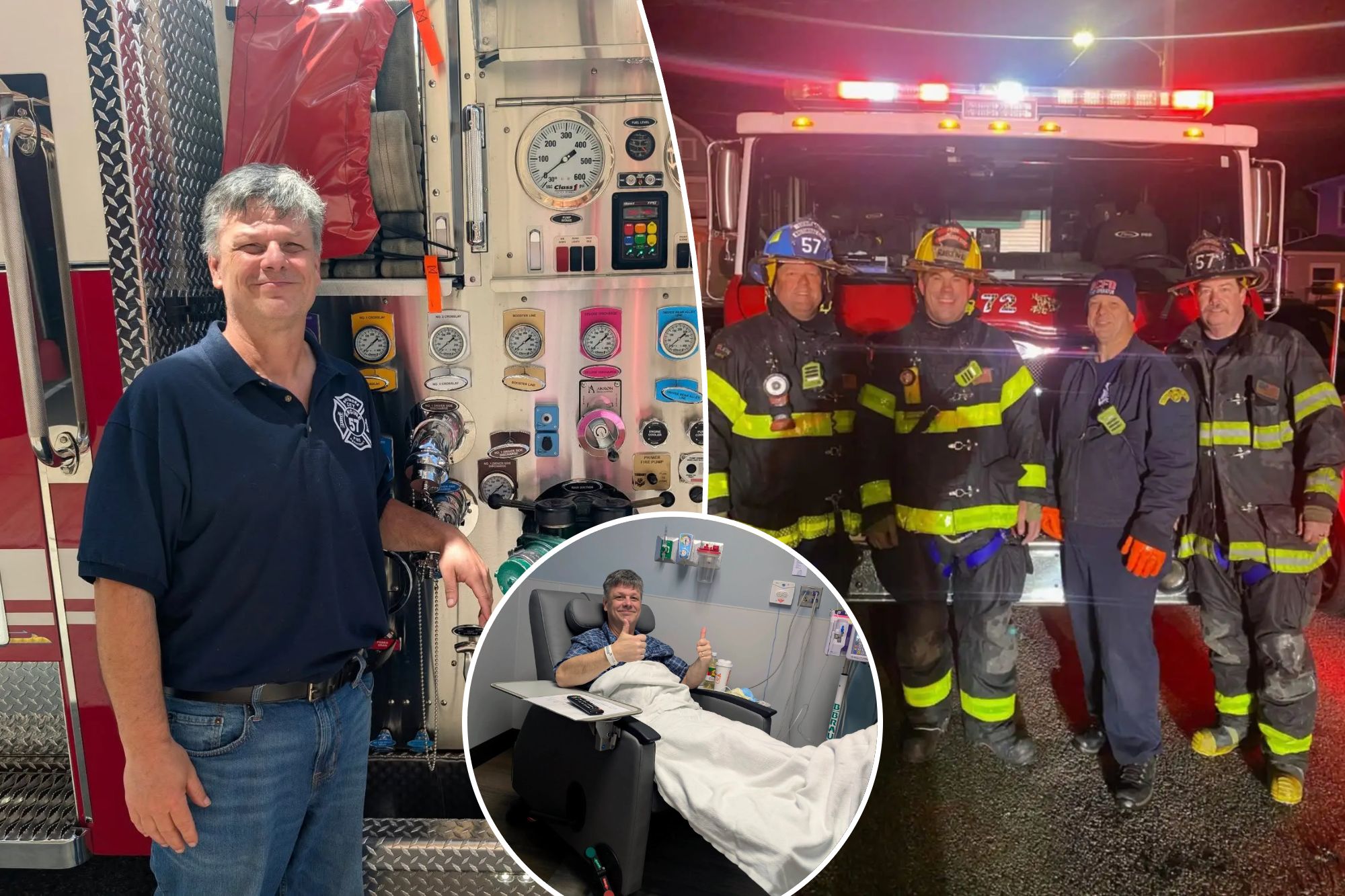The Baltimore Firefighter, Steve Dorsey, had the worst Valentine’s Day, but now he is love.
Dorsey, 56, was diagnosed on February 14 with a 4 -phase esophagus cancer that extended to the ganglia and the liver.
The 21 -year -old veteran is on medical permission, subjected to chemotherapy in the hope of reducing his tumors, while his colleagues gather around him.
“My Baltimore City Fire Brigade’s co -workers have only been prominent and supportive,” Dorsey told The Post. “The love I got from them has been incredible.”
Esophageal cancer is an aggressive and mortal cancer often trapped in advanced stages. The likelihood of surviving five years is low, especially for patients in phase 4.
Doversy shares his story to encourage the first to respond to being proactive about his health. Four’s father also tries to get fire parks across the country to offer the DNA DNA test of Lucid diagnostics to detect abnormal esophageal cells before progressing to cancer.
“My mission is to raise awareness of esophagus cancer [since firefighters have a] 63% higher [risk] that the general population. It is there with testicular cancer and mesothelioma, “said Dorsey.
“And also aware that there is evidence available.”
Doversy said he underwent routine reviews every six months, with high blood pressure his only concern.
Everything went well until January, when it began to have trouble swallowing. The difficulties were “very benign” at first, sometimes you should drink some liquids for washing food.
“He started to get worse, where it was very difficult to eat anything, basically, without regurgitating,” he recalled Dorsey.
A series of evidence revealed masses to their lower esophagus, lymph nodes and liver.
Chemotherapy began in March and is expected to last until June.
“I will have a follow -up CT scan to see what the tumors are like,” he shared Dorsey. “We hope that they have been reduced and if chemotherapy and immunotherapy are successful, we will only continue to move on.”
Dorsey, meanwhile, has been making regular trips to the fire to see his friends.
The long time bomb operator, assigned to the 57 engine in Curtis Bay, misses the camaraderie. During a recent visit, he was the first to support a new Firetruck in the Firehouse, a symbolic tradition in the Fire Service.
“Fire fighting is one of those jobs you love absolutely the job,” said Doversy. “I like to say that being a firefighter in the city of Baltimore is the best job in the world and probably one of the worst places you can do.”
Dorsey is a third -generation baltimore firefighter. He had been dreaming of the first lines for some time and decided to go for the age of 35 when his eldest son graduated from high school.
While knowing the physical dangers, he wanted a better understanding of long -term health risks when he joined the department in 2004.
Firefighters hold toxic chemicals, smoke, extreme heat and strong noise while saving lives, increasing the risk of post -traumatic stress disorder, heart disease, respiratory diseases and certain types of cancer.
Beyond fighting the fires, Dorsey said he was constantly exposed to diesel exhaust to fire due to inappropriate ventilation.
Even their protection team aggravated the problem.
“When I came to the Fire Corps in 2004, the Firefighters only received a group of participation stakes,” he said, emphasizing that Dirty Gear used to be a badge of honor.
“Changes have been made over the years,” he said. “We have been published a second set of participation gears (the shelter and the pants) and, therefore, after a fire, we send them and wash them and we pass to our second set of gears.”
A spokesman for the Baltimore Fire Brigade did not return the request for comments for the publication.
Doversy said that the city recently agreed that its cancer is a disease of the service line.
Esophagus cancer is relatively rare cancer, which represents only 1% of all cases of cancer in the United States.
The Fire Cancer Support Network reports that firefighters are 39% more risk of dying from esophagus cancer.
The Lucid diagnosis, based in Manhattan, hopes to catch the cancer before it develops.
ESOGARD is a non -invasive test that uses a swallowable capsule to collect lower esophagus cells for analysis.
The test, which was commercially launched in 2019, seeks genetic markers associated with Barrett (esophageal precancer) and esophageal adenocarcinoma (cancer).
“Many Firefighters all over the country are associated with Escar to offer this test to its members. The city of Baltimore was not one,” said Dorsey.
Lucid said he has analyzed more than 10,000 firefighters. In New York, small events are held with the FDNY.
“We have been related to the WTC Foundation of 11/11 to add -as a covered benefit, but we do not currently have an active policy,” Lucid told The Post.
“We are optimistic for doctors to see the value of this high-risk group and we can completely implement it in the NYC WTC in the coming months.”
As you spread awareness of the importance of cancer projections, Dorsey is celebrated by its community due to its impact and resilience.
Two background collectors have been established to help pay dorsey’s medical expenses. More than $ 9,700 have been raised through Goofundme.
Finally, its sick leave will become a medical retirement. Five grandfather was planning to retire in six or seven years, not.
“I didn’t expect it to happen so soon or happened like that,” said Dorsey. But as he reflected on his career, he said that “it has been a great walk.”
#Exclusive #Dear #Firefighters #fighting #phase #cancer #track #benign #sign
Image Source : nypost.com
